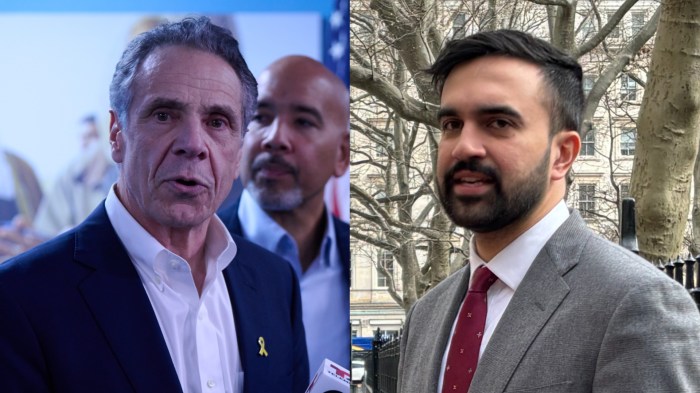With the expiration on New York’s rent regulations just days away, housing advocates and several Democratic legislators continue to push for a package of bills to establish universal rent control across the state.
Nine bills have been introduced in the State Senate and Assembly to address landlord-friendly policies in the laws that regulate rent for about one million apartments in the city. Those policies have caused a drastic decrease in the number of rent-stabilized apartments in New York City and elsewhere, advocates say.
“We’re feeling cautiously optimistic,” said Andrea Shapiro, the program manager for the Metropolitan Council on Housing, which has advocated for universal rent control for decades. “We’re not going to stop fighting until the very end, until everything is signed by the governor.”
The Metropolitan Council on Housing is part of the statewide Housing Justice for All coalition that is pushing for all nine proposals. All of them have to pass to truly protect tenants, Shapiro said.
“If one doesn’t pass, it provides a loophole that could hurt all tenants,” she said.
Some of the bills go beyond protecting rent-stabilized tenants and extend safeguards to renters who have previously not been protected by the state’s regulations.
“Certainly some bills … will be a heavier lift than others,” said State Sen. Julia Salazar, who represents northern Brooklyn and introduced one of the bills. But she agreed with Shapiro that all nine need to pass.
“Our affordable housing crisis is like a sinking boat, and all of these bills address policies that are like one of the holes in the boat that’s rapidly filling with water,” she said. “If we don’t pass the entire package, then inevitably many tenants, thousands actually, if any one of these is omitted, will be left out and their situations won’t change.”
While Majority Leader Andrea Stewart-Cousins said the Senate has the support to pass all nine bills in a statement on June 4, Gov. Andrew M. Cuomo has said he doesn’t believe there are enough votes.
“I call on the Senate to pass the bills today,” he said in a statement on June 5. “I am ready to sign the bills if they pass. If they do not pass the bills today it means they cannot and New Yorkers should know the respective positions so we can pass a new law before the expiration of the existing rent law on June 15.”
The Senate has yet to call votes on the bills.
The real estate industry has led a campaign against the reforms with TV ads and demonstrations. Some mom-and-pop landlords worry they won’t be able to afford to keep their buildings if the bills pass.
Here’s a rundown of the bills in consideration:
Expand the Emergency Tenant Protection Act (S5040/A7046)
Primary sponsors: Sen. Neil D. Breslin, Assemb. Kevin A. Cahill
Status: In committee
What it would do: Allow any city or town across the state to regulate rents and evictions when there is a housing emergency, defined by a vacancy rate of 5 percent or less. Currently, the law has “arbitrary geographic restrictions” that only allow Nassau, Westchester and Rockland counties and New York City to regulate rents in a housing emergency.
Prohibit evictions ‘without good cause’ (S2892/A5030)
Primary sponsors: Sen. Julia Salazar, Assemb. Pamela Hunter
Status: In committee
What it would do: Prohibit a landlord from evicting a tenant without a good reason. Valid reasons include failure to pay rent — unless the failure was due to an “unconscionable” rent increase. “Unconscionable” is defined as increases more than 1.5 times the local inflation rate.
Other valid reasons would be “the violation of a substantial obligation of the tenancy, committing or permitting a nuisance, permitting the premises to be used for an illegal purpose, or if, under certain conditions, the to be premises are to be personally occupied by the landlord or close relatives of the landlord as their primary residence.”
End vacancy decontrol (S2591/A1198)
Primary sponsors: Senate Majority Leader Andrea Stewart-Cousins, Assemb. Linda B. Rosenthal
Status: In committee
What it would do: Repeal a provision that allows landlords to permanently deregulate rent-stabilized apartments when the rent becomes more than $2,700 and a tenant moves out. More than 300,000 rent-stabilized apartments were deregulated in New York City and surrounding counties because of vacancy decontrol, lawmakers said in the bill.
Eliminate the vacancy bonus (S185/A2351)
Primary sponsors: Sen. José M. Serrano, Assemb. Victor M. Pichardo
Status: In committee
What it would do: Repeal a provision that allows landlords to raise the price of a rent-stabilized unit by 20 percent (known as the “statutory vacancy bonus”) when the apartment changes tenants.
Make preferential rents permanent until vacancy (S2845A/A4349)
Primary sponsors: Sen. Liz Krueger, Assemb. Steven Cymbrowitz
Status: In committee
What it would do: Prohibit building owners from revoking a rent-stabilized tenant’s preferential rent, a price agreed to at an initial lease signing that is below the legally allowed maximum for an apartment, at lease renewals. Landlords would only be allowed to change the preferential rent when an apartment is vacated.

End permanent rent hikes for ‘major capital improvements’ (S3693/A6322)
Primary sponsors: Sen. Michael Gianaris, Assemb. Brian Barnwell
Status: In committee
What it would do: Eliminate a law that lets landlords permanently raise rents on rent-regulated apartments because of building-wide improvements or replacement of a building system. “Permanent increases in rents are no longer necessary to incentivize rental property owners to make, or to compensate landlords for, necessary major capital improvements,” the bill says, adding that tax incentives, increased property value and other benefits are sufficient.
“A substantial number of the rent increases previously granted for major capital improvements were tainted by inflated costs,” the bill says.
End permanent rent hikes for individual apartment improvements (S3770/A6465)
Primary sponsor: Sen. Brian Kavanagh, Assemb. Diana Richardson
Status: In committee
What it would do: Similar to the legislation above, this bill would repeal a provision that lets landlords permanently raise rent on a rent-stabilized apartment because of repairs or renovations. Lawmakers say the law allowed landlords to make unnecessary improvements just to raise the rent.
Extend time for overcharge complaints (S4169/A5251)
Primary sponsors: Sen. Zellnor Myrie, Assemb. Jeffrey Dinowitz
Status: In committee
What it would do: Eliminate the statute of limitations for rent-stabilized tenants to file rent overcharge complaints, which is currently four years, and allow the Division of Housing and Community Renewal, the body that oversees rent regulations, to review all relevant rent history when investigating complaints.
Rent control and rent stabilization parity (S299A/A167)
Primary sponsor: Sen. Brian A. Benjamin, Assemb. Linda B. Rosenthal
Status: In committee
What it would do: Cap the maximum rent increase on rent-controlled apartments at a rate on par with the Rent Guidelines Boards’ increases for rent-stabilized apartments. Currently, rent increases for rent-controlled apartments are not set by Rent Guidelines Boards the way increases for rent-stabilized apartments are and can often be much higher.

































